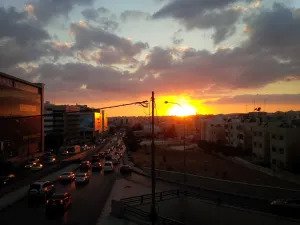A couple of years ago, I was introduced to the concept of City Resilience by some of my colleagues at Arup. Initially, I considered ‘resilience’ to be the likely next step for the ‘sustainability’ movement.
However, as I look more into it, I am changing my view and realising that resilience is its own field, with potentially a lot of new and exciting thinking to bring to the sphere of city planning and public policy.
What is it about?
Although a bit long, I often revert to this definition:
Urban Resilience is the capacity of individuals, communities, institutions, businesses, and systems within a city to survive, adapt, and grow no matter what kinds of chronic stresses and acute shocks they experience.

I like it because it brings together many of the key concepts:
Systems – our cities have become an intricate web of complex systems. This is precisely why the concept of resilience which originates in the field of ecology (i.e., resilient ecosystems), has great relevance to the urban context today.
Survive, adapt, grow – resilience is not just about ‘bouncing back’ after an event; it is also about building flexibility into the city systems such they can adapt to the change and thus do not need to ‘bounce back’.
Chronic and acute – resilience is not just about reacting to sudden catastrophic events such as earthquakes and terror attacks. It is also about dealing with long-term challenges such as poverty and climate change.
How is it different?
Resilience widens discussions and debates such that they are about the entire population, particularly the vulnerable. It brings a recognition that a city is only as strong as its weakest link (system, demographic group, or neighbourhood). This becomes obvious as soon as system thinking is applied to a city.
Planning for resilience also brings a realisation that good planning is not about predicting the future and designing to accommodate or mitigate it. Rather, it is about holistic, responsible strategic planning and implementation that results in a strong city that can flourish regardless of circumstances, many of which are beyond our control.
Finally, resilience is not about the triple bottom line. While it encompasses all three aspects (environmental, social, economic) and more, it does so in a different paradigm – one which relates more to complex realities and outcomes than to individual disciplines. Only once I stopped looking for the environmental/social/economic tags did I begin to grasp what resilience could be about.
What are cities in the Middle East doing about Resilience?
Amman, Byblos, and Ramallah have already been chosen to be part of the 100 Resilient Cities (100RC) challenge and are developing strategies related to their specific challenges (including energy security, rapid expansion, and climate risks).
The recently released Dubai Plan 2021 explicitly references resilience in a number of places and implicitly refers to it in others.
A number of other countries in the region (e.g., Qatar and Oman) are looking into climate change adaptation strategies, which could be a way of beginning the wider discussion around resilience.
Want to find out more?
Resilience is a concept here to stay. I don’t think it will generate its own industry of consultants, advisors, and analysts like the sustainability movement have. Rather, I believe it will be a term city planners, and built-environment professionals will help to define and refine in the coming 5 – 10 years.
Global research and development initiatives, like the 100RC, will play an important part in applying the concepts to real-life situations.
If you’re interested in exploring the concept further and integrating the thinking into your own work, below are a few suggested links:


An informed and useful assessment Huda. I like the way that you have drawn on the Middle Eastern context to illustrate the applicability of the resilience concept.
The need for resilient thinking knows no geographical boundaries.